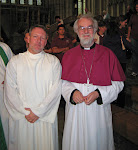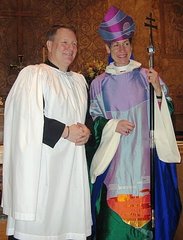Preached on Sunday, July 25, 2004 at St. Augustine's Church, Croton-on-Hudson, NY: http://www.stacroton.org/
Lectionary readings this sermon is based on are found at:
http://www.io.com/~kellywp/YearC/Pentecost/CProp12.html
Opening Prayer:
“When I called, you answered me; you increased my strength within me.”
(From Psalm 138, BCP, p. 793)
+ In the name of the Father, the Son and the Holy Spirit. Amen.
The Lord’s Prayer, as we call it, appears twice in the Gospels; as we have it today in Luke, and in a slightly different form in Matthew. In Matthew, just before Jesus tells his disciples what to pray, he tells them how to pray. Do not be like the hypocrites, he says, praying loudly in the streets, drawing attention to your put-on piety. Rather, “Go into your room and shut the door and pray to your Father who is in secret; and your Father who sees in secret will reward you.” (Mt 6:6)
With the Lord’s Prayer, Jesus invites us into intimacy with God. Intimacy is hard. It can be frightening. I think that’s why it’s sometimes so difficult to make time to pray or to find the true prayer of our heart to give voice to. It takes time and consistent, progressive action. Intimacy requires a deep knowledge of oneself; and it requires the courage to share that knowledge with another, maybe especially with God.
We recite the Lord’s Prayer so often, as a matter of rote, and I don’t know that we always hear all that’s in the prayer. In a sense, familiarity has bred ignorance of what the prayer has to say. Perhaps this centuries old formula still has something to teach us about how to approach God in prayer in a truly intimate way.
“Father, hallowed be your name”:
Being 21st century Christians rather than 1st century Jews, we miss some of the tension in this one statement. For Jews, the actual name of God is the holiest of names, the holiest of words, and is therefore unutterable. The common form of address in prayer was “adonai” which translates to “my lord”. But here, Jesus is telling us to call God -- to name God -- as father. In the Gospel sources, this term was probably the Aramaic “Abba” which translates as “Daddy” or “Papa”. We’re invited to address God using one of our first words. It couldn’t be more unexpected if the Prince of Wales was giving us permission to address his all-powerful parent as “Liz”. Jesus quickly adds “hallowed by your name;” the old form coupled with the new. He offers innovation while preserving tradition. He reforms while maintaining a reverence for that which is ancient practice. Obviously, Jesus was, in fact, an Anglican.
“Your kingdom come”:
This would have been a powerful statement for 1st century listeners in Palestine. After years of occupation by a brutal, blasphemous foreign power, to call for ‘God’s kingdom to come’ would sound like a battle cry against the injustice heaped on by the occupiers. I think there are Palestinians today who hear these words in much the same way. I remember on the inner sleeve of an album from Sinead O’Connor (if you don’t know what an album is or what its inner sleeve looks like, or who Sinead O’Connor is, ask you parents!) was the statement: “God’s place is the world, but the world is not God’s place.” I think that’s true in a profound way. The world is our place. Creation is God’s gift to us. What the world has become is our doing. After September 11th, so many people seemed to be asking “How could God allow this to happen?” I think the more germane question is “How could we have allowed this to happen?” Those of us who believe in and profess Gospel values know that the world is not run by those values. For us to call for ‘God’s kingdom to come’ is for us to call for justice and peace, for equality of rights and resources; it is to pray for “the Word” to become our flesh, our world. The 17th century Anglican Bishop Jeremy Taylor said “Whatsoever we beg of God, let us also work for it.” Now seems like a good time to remind you all to vote this November, and to vote your Gospel values.
“Give us each day our daily bread”:
Jesus’s listeners would have heard the echo in his words of the miracle of the manna from heaven that the Israelites ate on the flight out of Egypt. The tense here and in the two remaining petitions of the prayer is the imperative, the command form of the verb. Jesus is reminding us that “all things come of thee, oh Lord,” to quote the Prayer Book, while at the same time saying that it is our right to ask -- even demand -- of God whatever we need. There are many things that sustain us: unconditional love, companionship, security, freedom from fear, peace, acceptance. Yet, if we are to ask God for what we need, we’d best uncover what it is that we truly need. Some time in reflection before praying this petition will likely not yield requests for a new SUV or bike or ball gown. What is it that you really need? What is it that will truly sustain you? God wants to know.
“Forgive us our sins, for we ourselves forgive everyone indebted to us”:
Jesus knows the connectedness between forgiveness of others and self-forgiveness. In the South, there’s a saying: “Be careful who you point your finger at, you’ll find more fingers pointing back at yourself.” The things we find most irritating, even unforgivable, in others are often our own, sometimes unacknowledged, shortcomings. I think the kind of forgiveness Jesus is talking about and that God offers is more than remission of guilt. It is a healing of the woundedness that sin is borne out of in ourselves and in others. The kind of forgiveness that heals and restores is not a simple transaction between us and God; it must be a pathway, a conduit that flows from God through us and out into the world. God’s forgiveness is a river that we must not dam, but let run free. To be forgiven and to forgive means that we will be brought into a deeper awareness of our true selves -- it gives us a more intimate knowledge of the humanity of others, which is none other than our own humanity, flawed yet forgiven.
“Bring us not to the time of trial”:
I don’t know that I pray this petition with very much faith after September 11th. Like many of us, I’m always a bit on guard for the next ‘time of trial.’ As August approaches, in my office in the city, we’re updating our emergency phone list and making sure everyone has a ‘go bag’ at his or her desk, with some water, cookies, a battery powered radio, comfortable shoes. And we’re making sure everyone knows where the mustering site is if we have to evacuate the building for another blackout or an action against the upcoming Republican convention. I expect another time of trial; but I will not stop praying that such trials be not visited upon any of us ever again.
“Ask, and it will be given you; search, and you will find; knock, and the door will be opened for you”:
Much easier said than done. To know oneself well enough to meet God in a place of need, of longing, of transition takes work; and brings sometimes uncomfortable awarenesses to the surface. In any truly intimate relationship, we meet ourselves in the other -- and we meet our deeper selves as we move deeper into relationship with God through prayer.
And what Jesus is telling us is that the prayer of God’s heart is to know us intimately -- in all our need, in all our uncertainty, in all our imperfections. The God who created our humanity desires nothing more than to share it -- all of it -- with us.
I think the late 16th century French bishop Francois Fenelon understood the intimacy God is calling us to in prayer -- and the difficulty that lies in approaching that intimacy. Fenelon wrote an almost perfect restatement of the Lord’s Prayer, which seems to come more out of our perspective.
Lord, I don't know what I ought to ask of you.
You alone know what I need.
You love me better than I know how to love myself.
O Father, give to me, your child, that which I don't know how to ask...
I would have no other wish than to do your will.
Teach me to pray.
Pray yourself in me.
Amen
© Mark Robin Collins
20 December 2006
Sermon for Year C, Proper 12
Subscribe to:
Post Comments (Atom)







No comments:
Post a Comment